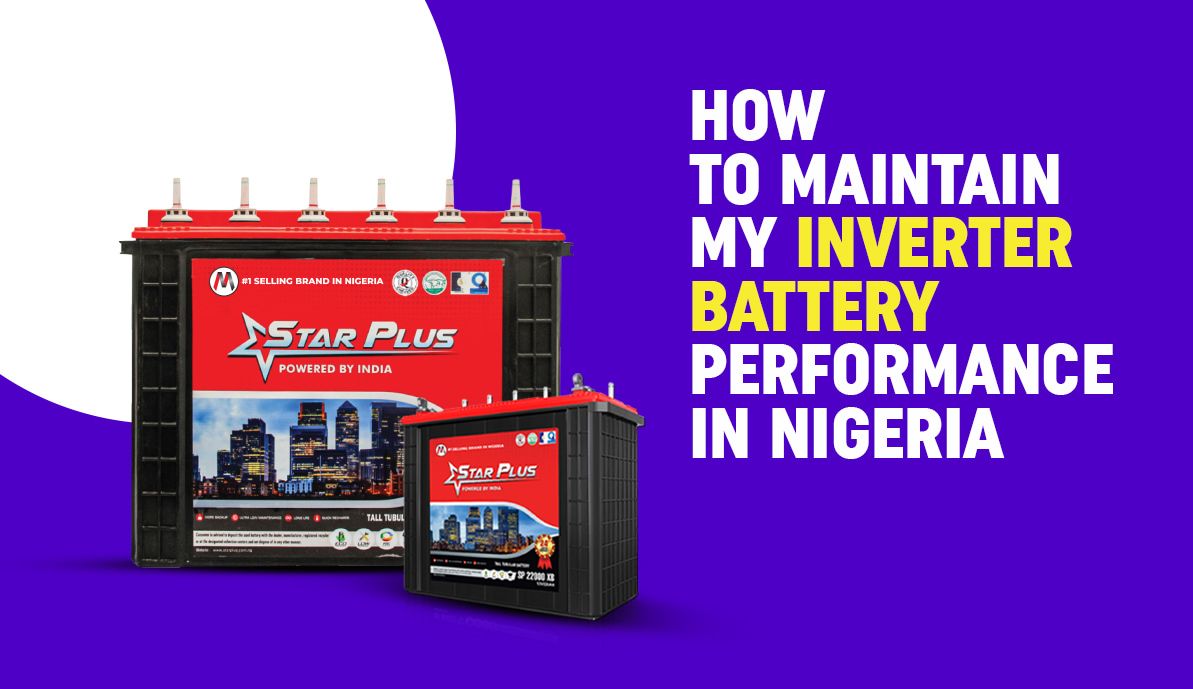The longevity of your inverters is contingent on the durability of your batteries, which function as the backbone of your energy generator. However, the lack of proper maintenance might reduce the functioning ability of inverter batteries. This could lead to a gradual decrease in the power-backup capacity of your inverters, potentially disrupting your activities during frequent power outages.
To get an unlimited power supply, you need to take proper care of your inverter battery. Nigeria continues to experience consistent power outages, thereby demanding a steady power backup. We at Star Plus Battery can provide you with the best inverter battery supplies in Nigeria and recommend the best maintenance tips.
Continue reading this blog to understand how you can maintain your inverter battery performance in Nigeria.
Reasons Behind High Battery Drainage Before Expected Timeframe
An inverter battery is susceptible to frequent charge and discharge cycles. This increases the risks of short circuits and faster erosion of your inverter battery plates. Apart from deep power discharges, the following reasons increase battery drainage before the expected time:
Compromising Quality over Price
Users of inverter batteries often compromise product quality over price. Purchasing economically cheaper inverter batteries might not comply with performance efficiency.
Several second-hand battery suppliers in Nigeria might deliver low-performing inverter batteries. These batteries, when installed in your inverter, fail to compete with charge-discharge cycles.
Over Battery Usage
Excessive battery usage will result in excessive battery drainage over a considerable period. High Battery usage of inverters in Nigeria often decreases their long-term performance ability. Users usually overload inverter batteries during frequent power outages, causing permanent damage.
Battery Overcharging
Overcharging your inverter batteries can reduce their performance ability. Your overheated battery plates can corrode internal sections of your inverter. Consistent battery charging diminishes the actual charge-discharging capability of your inverter during power outages.
Considering the reasons above, you can follow the below-mentioned tips for more accessible and more effective maintenance.
Tips And Processes For Battery Maintenance
1. Keep Inverter Batteries Corrosion and Rust Free
Rusting in terminals often reduces current flow to and from batteries. Excessive dust accumulation can reduce airflow and prevent heat dissipation. This can overheat your battery plates and even hold moisture within the vents and increase rusting propensity.
A restricted flow of current results in slow battery charging and eventually decreases battery life. To maintain a corrosion-free environment, ensure proper ventilation. Check the inverter battery vents to remove any dust or debris quickly.
Our inverter batteries can withstand high temperatures during charge and discharge cycles. However, you must monitor the temperature below 45 degrees Celsius to prevent the inverter from overheating.
2. Keep Batteries Away from Thermal Environment
Thermal Environment refers to places with high risks of fire outbreaks. You need to keep your inverter batteries away from the thermal environment.
To prevent sparks or ignition, refrain from performing fire or smoke-induced activities near your inverters. If your inverter batteries are not installed, store them in a cooler place away from potential fire outbreaks.
3. Checking Water Levels In Batteries
Water shortage is a significant concern across Nigerian households and industrial sectors. Apart from water shortage, the equatorial climate of Nigeria increases the need for water. Your inverter in Nigeria is subjected to frequent water loss and overheating due to high temperatures.
Your inverter batteries contain water levels that internally maintain the battery’s temperature. Excessive heat or adverse climatic conditions can decrease the water levels of your inverter battery. In such cases, you need to monitor and top up the water levels of your inverter regularly.
At Star Plus Battery, we design our inverter batteries with a particular focus on high water backup capacity. This minimises water loss and the need for frequent electrolyte top-ups, ensuring that your inverter batteries will efficiently function without maximum energy drainage in high temperatures.
4. Maintain Optimal Charging Routine
Overcharging your batteries will increase the erosion of their plates and reduce their lifespan. You need to maintain an optimal charging routine to prevent battery overheating.
Regularly charge your batteries to prevent self-discharging cycles. Follow our charging instructions prior to and after installing an inverter battery. This can help you to ensure the safety and quality of the charging process.
5. Avoid Using Energy-Draining Devices
Apart from proper storage and charging, you can avoid energy-draining devices. We recommend installing either CFLs or LED lights to reduce electricity consumption. This will help stabilise internal load management and prevent excessive discharge for your inverter battery.
Key Takeaways
Maintaining the quality and longevity of an inverter battery is not easy, but with the tips above, you can quickly secure battery lifespan. We at Star Plus Battery ensure that our inverter batteries can sustain multiple energy cycles without compromising longevity.
As a user, you need safe storage to prevent moisture, dust accumulation, and fire outbreaks. We hope this article helps you with proper inverter battery maintenance. Connect with us today for proper guidance on installation and managing battery performance.



0 Comments